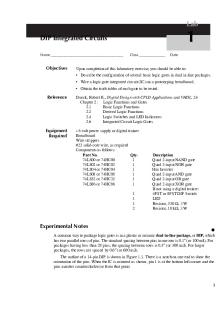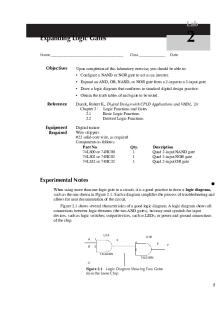White Lines (Don’t, Don’t Do It) PDF

| Title | White Lines (Don’t, Don’t Do It) |
|---|---|
| Author | Tori Raimondi |
| Course | Hip-Hop Cinema |
| Institution | University of Arizona |
| Pages | 4 |
| File Size | 76.4 KB |
| File Type | |
| Total Downloads | 27 |
| Total Views | 126 |
Summary
White Lines (Don’t, Don’t Do It) Hip Hop Cinema Essay...
Description
Tori Raimondi Professor Sanchez AFAS 371 21 January 2018 “White Lines (Don’t, Don’t Do It)” https://www.youtube.com/watch?v=gI37UZXO2Cc
The hip-hop song White Lines (Don’t, Don’t Do It) was released by Grandmaster Flash and the Furious Five. The lyrics by Grandmaster Flash and the Furious Five are “Athletes rejected, governors corrected. Gangsters, thugs, and smugglers are thoroughly respected. The money gets divided. The women get excited. Now I'm broke and it's no joke. It's hard as hell to fight it, don't buy it!” This song is classified as a song from the blues because it demonstrates an unpleasant experience that the hip-hop artist was capable of coming back from. In the essential textbook, Understanding Black American Aspects to Hip Hop Cinema the author articulates the proposition as “a belief that life’s burdens can be transformed into hope, salvation, the promise of redemption” (Sanchez, 5). This excerpt from the book is significant due to it relating directly to these lyrics. It directly relates to the lyrics within White Lines (Don’t, Don’t Do It) because it is transforming the negatives into positives.
Songs of the blues don’t uphold the brutal experience it reaffirms the values of life (Sanchez, 5). In the lyrics of White Lines (Don’t, Don’t Do It) goes on to make it known that coming to be caught up within that way of life with a heavy influence of drugs is not a joke. This way of life leads to leaves you poverty-stricken and ruined so don’t choose to buy it. The drugs
and that lifestyle is excessively present in a “in your face” type of way, but the artist makes it clear that you need to turn your head and choose to create a more ethical life for yourself. This message gets lost in the crowd because the outside world associates artist such as Grandmaster Flash and the Furious Five with this negative way of life.
In the book, Understanding Black American Aspects to Hip Hop Cinema brings about a remarkable point by stating “the blues is tied to the reality of living in a culture that routinely made life dangerous for its black citizens, but one in which blacks nonetheless found ways to reach a passionate detachment” (Sanchez,5). This executes a more profound understanding to the song because in spite of this way of life retaining a lot of disadvantages and risks the artists were still able to disconnect that lifestyle from their own and learn from their mistakes. Henry Ford once said “The only real mistake is the one from which we learn nothing”, these artists learned something and taught that lesson through their music while coped with those experiences through their lyrics.
Just like how Sanchez said, “songs about the blues don’t affirm the brutal experience it reaffirms the values of life”. An additional example of how the song White Lines (Don’t, Don’t Do It) reaffirms their existence is by bringing into play expressions such as “I” and “we” because it shows that these experiences came from the artist himself. The artist is human too and makes mistakes, but gains knowledge from these mistakes and creates great music out of it all. Just because the artist made a song about cocaine does not mean the artist is a bad person or a gangster or anything from that sort of lifestyle. This is just the artist using his past as a resource to change for the better!
In conclusion, the hip-hop song White Lines (Don’t, Don’t Do It) systematically keeps up with the three-step process of the blues by obtaining the strength to keep moving in a problematic situation. This song could help someone in a similar situation and give them the inspiration to get out of it just like the artist experienced and continues to portrays through his lyrics.
Works Cited
Sanchez, Tani. Understanding Black American Aspects in Hip-Hop Cinema. United States of America: Sentia, 2016. 21 January 2017. Print....
Similar Free PDFs

White Lines (Don’t, Don’t Do It)
- 4 Pages

DOnt look at it its useless
- 5 Pages

COA+Syllabus - i dont know
- 3 Pages

Modz Shop Id List - Dont
- 29 Pages

Oil and Vinegar Dont Mix
- 8 Pages

Lab 21 - I DONT REMEMBER
- 4 Pages

Chapter 11 - dont remember prof
- 1 Pages

Lab 13 - I DONT REMEMBER
- 10 Pages

Lab 24 - I DONT REMEMBER
- 8 Pages

Lab 17 - I DONT REMEMBER
- 8 Pages

Lab 01 - I DONT REMEMBER
- 4 Pages

Lab 12 - I DONT REMEMBER
- 16 Pages

Assignment 7 - i dont remember
- 2 Pages

Lab 33 - I DONT REMEMBER
- 6 Pages

Lab 02 - I DONT REMEMBER
- 6 Pages
Popular Institutions
- Tinajero National High School - Annex
- Politeknik Caltex Riau
- Yokohama City University
- SGT University
- University of Al-Qadisiyah
- Divine Word College of Vigan
- Techniek College Rotterdam
- Universidade de Santiago
- Universiti Teknologi MARA Cawangan Johor Kampus Pasir Gudang
- Poltekkes Kemenkes Yogyakarta
- Baguio City National High School
- Colegio san marcos
- preparatoria uno
- Centro de Bachillerato Tecnológico Industrial y de Servicios No. 107
- Dalian Maritime University
- Quang Trung Secondary School
- Colegio Tecnológico en Informática
- Corporación Regional de Educación Superior
- Grupo CEDVA
- Dar Al Uloom University
- Centro de Estudios Preuniversitarios de la Universidad Nacional de Ingeniería
- 上智大学
- Aakash International School, Nuna Majara
- San Felipe Neri Catholic School
- Kang Chiao International School - New Taipei City
- Misamis Occidental National High School
- Institución Educativa Escuela Normal Juan Ladrilleros
- Kolehiyo ng Pantukan
- Batanes State College
- Instituto Continental
- Sekolah Menengah Kejuruan Kesehatan Kaltara (Tarakan)
- Colegio de La Inmaculada Concepcion - Cebu
